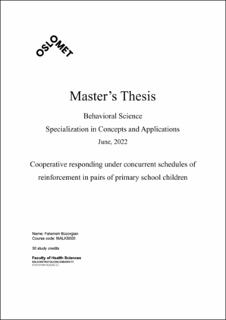| dc.description.abstract | The present project employs an adapted version of the software Xadrez, developed by Carvalho et al. (2016) and Todorov & Vasconcelos (2015). Xadrez to study choice in pairs of children under concurrent schedules of reinforcement. The experimental design is inspired by De Carvalho et al. (2016) earlier study on the effects of cultural consequences and experimental analysis of behavior of persons in groups. Their study was a replicated and extended version of Vasconcelos & Todorov (2015) studies with additional measures of variability.
Whereas previous studies used a chessboard design, a board game with a solid background will be used and the playing pieces are smiley faces (as seen in Figure 1) is used in the present study, having the aggregated product remain the same. The version of the gaming software Xadrez used in the present thesis was developed as part of Dale (2021) master thesis. Dale used version 2.11.12 in his experiment, while in this present study version 2.11.13 was used. There will be similarities in the use of methods as in earlier studies.
While earlier studies (Todorov & Vasconcelos, 2015; de Carvalho et al., 2016; Dale, 2021) used university students as participants, the present study will use pairs of children between the ages of 10 and 12 as participants. The choice behavior of the children will be studied under a concurrent variable-interval (VI VI) schedule, and the focus will be to examine how the participants coordinate their responses. The study will investigate whether coordinated responses of the four pairs were sensitive to changes in rates of reinforcement and if they were under the control of each other's responses. The reinforcement in the concurrent variable interval (VI) schedules is simultaneously available for the participants. | en_US |
